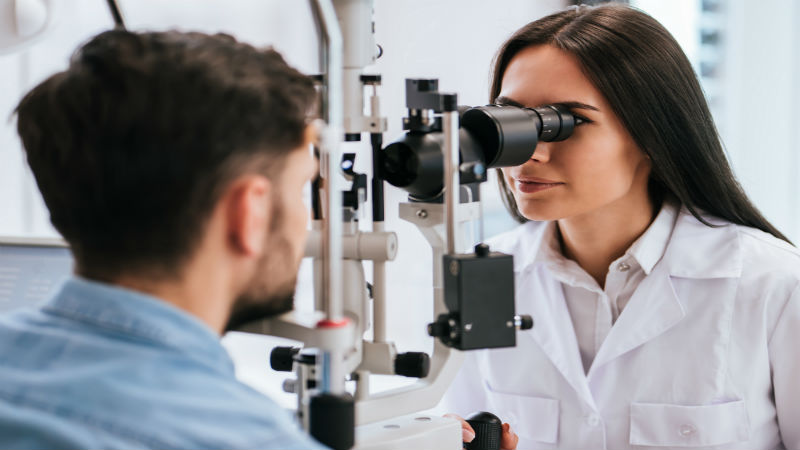It is important to understand which eye doctor will help with your specific problems. The level of expertise and training will vary depending on which kind of eye doctor you go to see. If you google optometrist, optician, or ophthalmologist near me, then you can find an appropriate doctor near your home.
All three types of eye doctors can fix and fit you into a pair of glasses.
Optometrist
After getting a college degree, if you want to become an optometrist you need to continue your education and obtain a Doctor of Optometry (OD) degree.
Optometrists are qualified to perform various types of vision tests and eye exams.

The exams the optometrist administers can indicate if you are nearsighted, farsighted, or have astigmatism.
Nearsightedness is when light does not get focused properly in the retina once it comes into the eye. This means the patient can not see objects that are far away well.
Farsightedness is the opposite: Objects nearby are difficult to see, and objects that are a distance away are clear.
Both conditions will lead to the patient receiving glasses or contacts to aid their vision.
Astigmatism is when your eye is not round. Everyone has this condition to a slight degree, but people with more severe cases will have blurry vision that needs to be corrected.
The Optometrist primary goal is to provide and fit glasses or contacts for patients with vision problems.
If tests indicate you may have glaucoma or any other severe eye condition, the optometrist must recommend you go see an ophthalmologist who can properly diagnose and offer treatment options for whatever issue is adversely affecting your vision.
Ophthalmologist
Ophthalmologists are licensed to practice medicine and perform surgery related to the eye. Ophthalmologists go to school for eight years: Four years for their undergraduate degree and four more years of medical college. At the end of their training, they are MDs or medical doctors.
After receiving their MD, an Ophthalmologist will receive further in-depth training in their subspecialty area: the eye. An Ophthalmologist receives additional training related to things like the retina, glaucoma, pediatric eye care, the cornea, and other specialized training.

In addition to offering the same sorts of services an Optometrist offers, the Ophthalmologist can perform medical treatments, including surgery, depending on the condition they must treat.
Ophthalmologists can treat problems caused by glaucoma, cataracts, or macular degeneration. Some perform plastic surgery related to the area around the eye, such as wrinkle corrections or surgery to raise or lower eyelids.
Opticians
Opticians will design and fit your eyeglasses and contact lenses. They are not allowed to prescribe anything, but they take prescriptions from Optometrists or Ophthalmologists and do whatever the prescription requires. They are not allowed to diagnose or treat eye diseases or give eye exams.
Opticians do not need a four-year college degree to become certified. There are many two years, sometimes less, associate degree programs available. Each state has different requirements for Optician certification.
Opticians can repair or adjust your glasses and tell you which type of frame or lenses will work best for your physical makeup.
Opticians do not need as much training as Optometrist or Ophthalmologist, but they work with them to help patients with eyeglass or contact problems.
Which Doctor Should You Choose to See?
The Doctor you choose to visit all depends on your specific needs.
For simple exams or basic vision needs such as glasses or contacts, working with an Optometrist and Optician is fine.
If you have any other problems, such as a disease, an accident that has affected your eyes or vision, you will need to see an Ophthalmologist.

